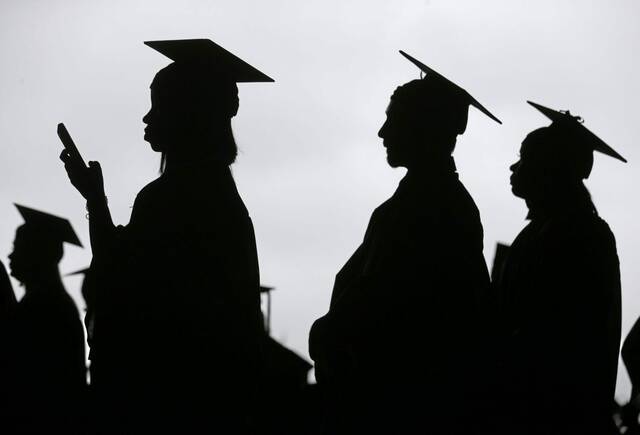People are talking about the Biden administration’s student loan relief plan “as if these loans will magically disappear,” according to Antony Davies, economics professor at Duquesne University in Pittsburgh.
The problem is, they won’t.
On Aug. 24, the administration announced its plans to cancel up to $10,000 of student debt for non-Pell Grant recipients, and up to $20,000 for Pell Grant recipients. Individual borrowers and married borrowers who make under $125,000 and $250,000, respectively, are eligible for the relief, which could benefit about 43 million Americans.
The University of Pennsylvania estimates that this debt cancellation will cost between $469 billion to $519 billion over a 10-year budget window.
Now, the federal government has a few options, Davies said.
It could spend less money than it would otherwise to make up for the cost. It could raise taxes to cover the payments it would have received from borrowers. Or, it could print more money, which would heighten inflationary problems.
“Any way you slice it, we haven’t forgiven student loans. We’ve simply shifted them off of students and onto the general public,” Davies said.
As borrowers prepare to apply for relief in October, economics professors in Western Pennsylvania anticipate lasting effects on the economy and higher education.
Benefit or burden?
Supporters of student debt cancellation say relief can energize the economy and benefit low-income borrowers, according to Najeeb Shafiq, a professor of education, economics and international affairs at the University of Pittsburgh.
Borrowers now have the opportunity to consume or invest more, Shafiq explained. For those who are struggling to make ends meet, debt relief can allow them to buy a house or start a small business.
“At the core level, this is really the main justification from the Biden administration, that this will ease people’s suffering,” Shafiq said.
Related:
• Federal student loan forgiveness is welcomed in Westmoreland, but overdue for some• Biden's student loan plan: What we know — and don't
• Surprise: Pa. borrowers may end up paying state taxes on forgiven student loans
The money has to be paid somehow, though. Shafiq expects higher taxes and possible inflationary pressure in the future.
The extent to which taxes might rise is unknown.
“Both the Biden administration and politicians are reluctant to share those details accurately and honestly,” Shafiq said.
He added it is “unclear” whether this is the best use of government funds. For example, the money used to cancel student debt could have been used to support universal early childhood education, an area where the United States is lacking, Shafiq said.
Davies is concerned about the precedent the decision could set. He called the cancellation a “burden” on taxpayers, and worries the country’s deficit could increase dramatically in the coming years.
Possible changes in store
Zachary Davis, an assistant professor of economics at Saint Vincent College in Unity, thinks this debt relief could launch “a cycle of more debt forgiveness.”
Davis was reluctant to trust debt cancellation cost estimates because he believes future loans will be canceled, as well.
This could attract more students to higher education institutions if they assume their loans will be canceled. It also could drive colleges and universities to increase tuition costs, which would generate more expensive loans.
Shafiq believes it is “highly likely” tuition costs will go up.
He explained that critics think loan relief is at odds with higher education cost reform. Previously, critics hoped that the ballooning costs of higher education would prevent families from attending these institutions, and colleges and universities would respond by decreasing tuition prices to attract more students.
Now, if the federal government essentially starts paying for part of students’ education, colleges and universities could get away with charging more.
“(Critics say the government) has basically taken away an important mechanism we had to discipline higher education institutions,” Shafiq said.
If the federal government continues down this loan cancellation path, Davies is concerned that it eventually will begin covering all higher education costs.
Then, he said, politicians could wonder why they don’t have a say over what college students learn in the classroom. This could create “public school 2.0,” he fears.
“Either a college education is valuable, or it isn’t,” Davies said. “If it is valuable, there’s no need to subsidize it, because it will pay for itself.”
Political consequences
In Shafiq’s view, one of the most serious consequences of this decision is the “resentment” it could create between working class families and universities.
“The fact that universities are likely to continue raising prices, it’s going to viewed by most blue-collar families as sort of this big agreement between the Democratic Party and universities,” he said.
Those who choose to look at the situation more cynically might also think the Biden administration chose to cancel loans to benefit the Democrat Party rather than benefit society, Shafiq said. It isn’t uncommon for politicians from both sides of the aisle to make decisions with political goals, rather than public policy, at the forefront.
With the midterm elections two months away, this could be seen as a way to “galvanize a base of Democratic voters,” Shafiq explained.
“Given how narrow some of these races are, it could work,” he said.
Loan cancellation might not be in the clear yet, though. If it is challenged in the courts, its fate could eventually end up in the hands of the conservative-leaning Supreme Court.
“I think there’s a very strong likelihood that this will go up to the Supreme Court,” Shafiq said, “and they will strike this down.”








